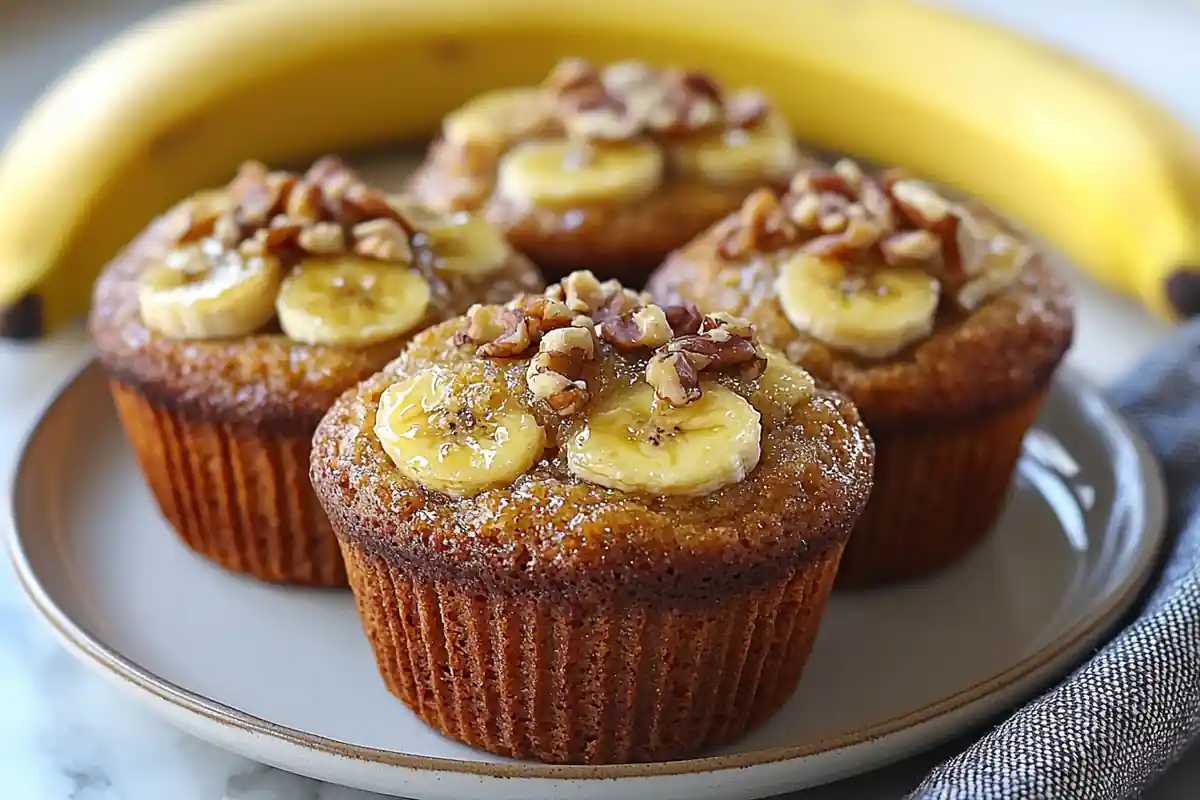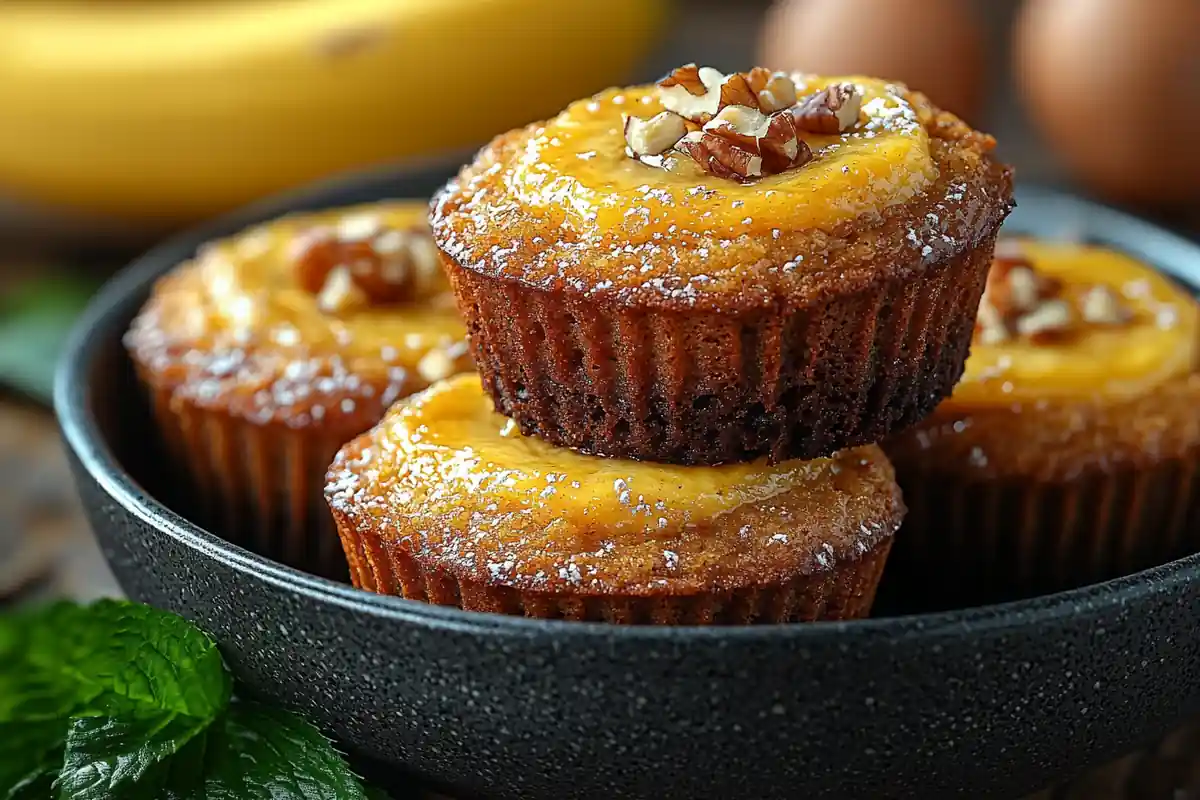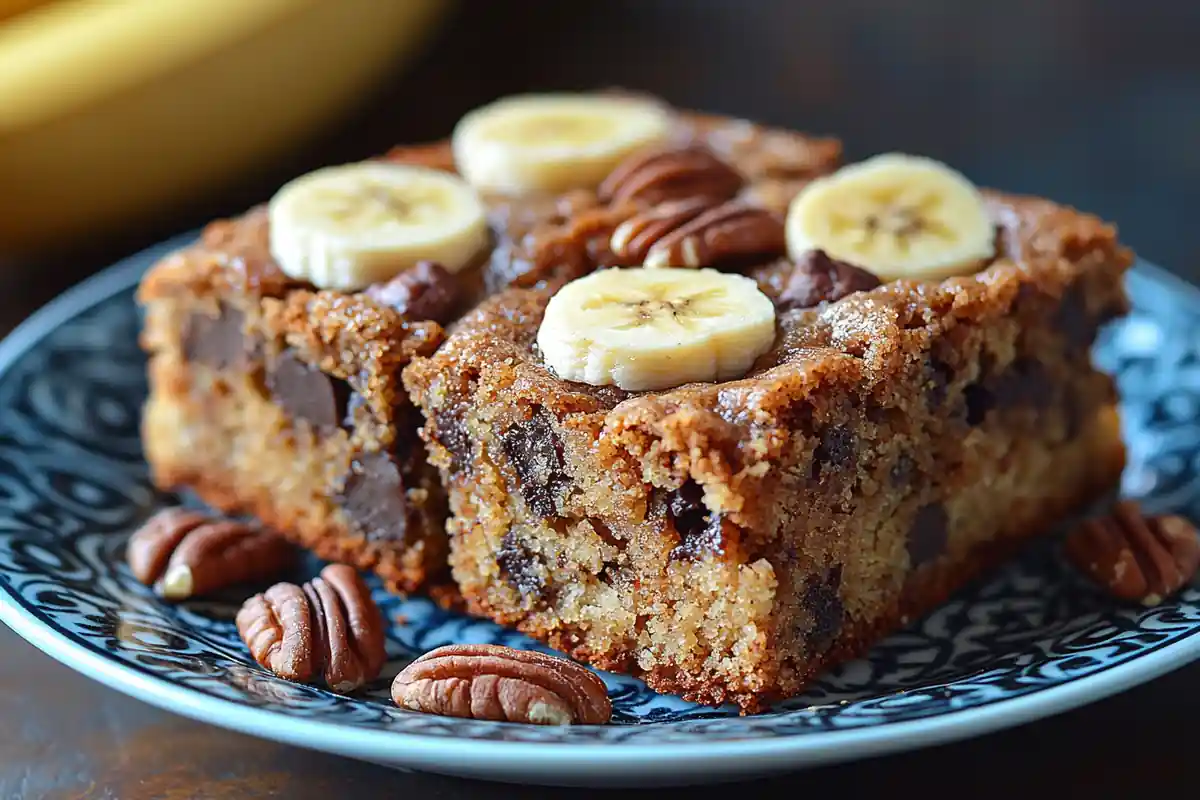Inoduction
Is banana cake made of eggs? It’s a question many home bakers ask when looking for a moist and fluffy banana cake recipe. While some versions rely on eggs for texture and structure, others can be made completely egg-free. In this article, we’ll explore both options and help you understand how eggs affect the outcome of your banana cake.
Is Banana Cake Made of Eggs
Traditional Banana Cake Recipe
Overview of Ingredients in a Traditional Banana Cake
The foundation of any classic banana cake is its ingredients. Eggs, for instance, play a pivotal role by binding the batter, providing structure, and contributing to its fluffy texture. Additionally, other essentials like ripe bananas, flour, sugar, and butter work together to create a moist and flavorful dessert.
Step-by-Step Recipe for Banana Cake with Eggs
Understanding that banana cake made of eggs yields a moister crumb will help you adjust recipes.
Ingredients:
- 2 large eggs (room temperature)
- 3 ripe bananas (mashed, approximately 1½ cups)
- 1 cup all-purpose flour (or whole wheat flour for a healthier twist)
- ½ cup granulated sugar
- ¼ cup brown sugar (adds richness)
- ½ cup unsalted butter (melted and cooled)
- 1 teaspoon baking powder
- ½ teaspoon baking soda
- ¼ teaspoon salt
- 1 teaspoon vanilla extract
- 3 tablespoons chopped nuts (optional, for added crunch)
Instructions:
- Preheat the Oven
Begin by preheating your oven to 180°C (350°F). Grease a loaf pan or line it with parchment paper to prevent sticking. - Prepare the Wet Ingredients
In a large mixing bowl, whisk together the eggs, mashed bananas, melted butter, and vanilla extract until smooth. - Combine the Dry Ingredients
Sift the flour, baking powder, baking soda, and salt into a separate bowl. This step ensures no lumps and gives a light texture. - Mix It All Together
Gradually fold the dry ingredients into the wet mixture. Stir gently until just combined—avoid overmixing, as it can make the cake dense. - Add Optional Ingredients
If using nuts, fold them into the batter. This step adds a delightful crunch to the cake. - Bake the Cake
Pour the batter into the prepared loaf pan. Smooth the top using a spatula, then bake for 50–55 minutes or until a toothpick inserted into the center comes out clean. - Cool and Serve
Let the cake cool in the pan for 10 minutes before transferring it to a wire rack. Slice and enjoy this moist banana cake!
Nutritional Content (per 100g)
| Nutrient | Amount |
|---|---|
| Calories | 220 |
| Protein | 4g |
| Fat | 8g |
| Carbohydrates | 32g |
| Sugar | 16g |
| Fiber | 2g |
Egg-Free Banana Cake Variations
Alternatives to Eggs in Banana Cake
While eggs are a staple in traditional recipes, they’re not indispensable. There are several creative alternatives to eggs that retain the moist and fluffy texture of banana cake. These substitutes are perfect for vegans, those with egg allergies, or anyone looking to experiment with their baking.
- Applesauce: A versatile and natural binder, applesauce keeps the cake moist while adding a hint of sweetness. Use ¼ cup per egg.
- Yogurt: Plain yogurt mimics the binding and moisture of eggs. Opt for ¼ cup of yogurt per egg replacement.
- Flaxseed or Chia Seeds: Mix one tablespoon of ground flaxseed or chia seeds with three tablespoons of water for a gel-like substitute.
- Mashed Bananas: Already a core ingredient, an extra banana can replace eggs seamlessly while boosting flavor.
Step-by-Step Recipe for Egg-Free Banana Cake
Ingredients:
- 1 cup mashed bananas (about 3 ripe bananas)
- ½ cup applesauce or yogurt (as an egg substitute)
- 1½ cups all-purpose flour
- ½ cup granulated sugar
- ¼ cup brown sugar
- ½ cup vegetable oil (or melted coconut oil)
- 1 teaspoon baking powder
- ½ teaspoon baking soda
- ¼ teaspoon salt
- 1 teaspoon vanilla extract
- Optional: ¼ cup chopped nuts or chocolate chips
Instructions:
- Prepare the Oven and Pan
Preheat your oven to 180°C (350°F). Grease a loaf pan or line it with parchment paper. - Mix the Wet Ingredients
In a mixing bowl, combine mashed bananas, applesauce (or yogurt), vegetable oil, and vanilla extract. Whisk until smooth. - Prepare the Dry Ingredients
In a separate bowl, sift together flour, baking powder, baking soda, and salt. Mixing the dry ingredients separately ensures an even distribution of leavening agents. - Combine Wet and Dry Mixtures
Gradually fold the dry ingredients into the wet mixture. Stir until the batter is smooth, but do not overmix. - Add Optional Toppings
Fold in nuts or chocolate chips for an extra layer of flavor and texture. - Bake
Pour the batter into the prepared pan. Bake for 50–60 minutes, checking with a toothpick for doneness. - Cool and Enjoy
Let the cake cool in the pan for 10 minutes before transferring it to a wire rack. Slice and serve warm or at room temperature. - Whether you’re following a traditional recipe or exploring alternatives, it’s useful to understand is banana cake made of eggs and why.
Comparison of Egg vs. Egg-Free Banana Cake
- Texture: While eggs give a fluffier rise, egg-free cakes remain moist and slightly denser.
- Flavor: Both versions have rich banana flavor, though egg substitutes like applesauce can subtly influence taste.
- Nutritional Content: Egg-free options tend to have less protein but may include added fiber, depending on the substitute.
Nutritional Content (per 100g)
| Nutrient | Amount |
|---|---|
| Calories | 210 |
| Protein | 3g |
| Fat | 7g |
| Carbohydrates | 33g |
| Sugar | 15g |
| Fiber | 3g |
Benefits of Including Eggs in Banana Cake
Role of Eggs in Baking
Eggs are not just an ingredient; they’re a game-changer in baking. Their unique properties significantly enhance the texture, structure, and flavor of banana cake. Here’s how they work:
- Binding Agent: Eggs act as a glue, holding ingredients together and ensuring a uniform cake structure.
- Leavening Agent: During baking, eggs trap air, creating a fluffy and light texture.
- Moisture Provider: Their liquid content contributes to the cake’s moistness.
- Flavor Enhancer: Eggs add richness, subtly complementing the sweetness of bananas.
Nutritional Value of Eggs in Banana Cake
Adding eggs doesn’t just improve texture; it boosts the cake’s nutritional profile. Eggs are an excellent source of protein, essential vitamins, and healthy fats.
Nutritional Highlights (Per Large Egg):
- Protein: 6 grams
- Vitamin D: 15% of the Daily Value
- Choline: Supports brain health
Why Eggs Are Popular in Banana Cake Recipes
Eggs remain a staple in baking because of their versatility and reliability. They consistently produce cakes with a soft crumb and balanced flavor. While substitutes work well, eggs deliver unparalleled results for traditional recipes.
Egg Myths Debunked
Some common misconceptions about eggs in baking include:
- Myth: Cakes with eggs are always dry.
- Truth: Overbaking, not eggs, causes dryness. Proper ratios ensure a moist texture.
- Myth: Egg substitutes are always healthier.
- Truth: While suitable for some, eggs provide nutrients that substitutes may lack.
Nutritional Content (Traditional Recipe with Eggs, per 100g)
| Nutrient | Amount |
|---|---|
| Calories | 220 |
| Protein | 5g |
| Fat | 9g |
| Carbohydrates | 30g |
| Sugar | 14g |
| Fiber | 2g |
Popular Misconceptions About Banana Cake Ingredients
All Banana Cakes Contain Eggs
It’s a widespread belief that banana cake recipes must include eggs. However, this isn’t true. Many bakers create delightful eggless banana cakes using substitutes like yogurt, applesauce, or flaxseed. These options prove that eggs are versatile but not always essential.
Egg-Free Banana Cakes Are Less Moist
This myth often discourages bakers from trying egg-free recipes. The truth is, moisture depends on the proper ratio of wet to dry ingredients. Substitutes like mashed bananas or applesauce can make egg-free cakes just as moist, if not more so.
Replacing Eggs Doesn’t Affect the Recipe
While substitutes can replicate many of the egg’s functions, they may not provide the exact same results. For instance:
- Texture: Egg-free cakes may have a denser crumb.
- Flavor: Some substitutes (like applesauce) slightly alter the taste.
Understanding these nuances ensures better results when baking without eggs.
Addressing Common Baking Mistakes
Mistakes can happen, whether you’re using eggs or not. Here’s how to avoid some pitfalls:
- Mistake: Overmixing the batter.
- Solution: Mix just until combined to prevent a tough texture.
- Mistake: Using underripe bananas.
- Solution: Opt for ripe bananas with plenty of brown spots for maximum sweetness.
- Mistake: Ignoring measurement accuracy.
- Solution: Use precise measurements for consistent results.
The Versatility of Banana Cake Recipes
Banana cake can adapt to suit a variety of dietary preferences. With or without eggs, it remains a crowd-pleaser, proving that flexibility is key in baking.
FAQs About Banana Cake
What makes banana cake soft and moist?
The secret to a soft and moist banana cake lies in the right balance of ingredients. Eggs, or their substitutes, help bind the batter while contributing moisture. Additionally, the use of ripe bananas ensures natural sweetness and softness. Overmixing the batter, however, can lead to a dense cake, so mix gently.
Can I replace eggs in banana cake?
Yes, you can! Popular substitutes include:
- ¼ cup applesauce
- 1 tablespoon flaxseed mixed with 3 tablespoons water
- ¼ cup yogurt
Each replacement works well, but results may vary slightly in texture and flavor.
Is banana cake suitable for vegans?
With the right adjustments, banana cake can be made completely vegan. Replace eggs with flaxseed or applesauce and use plant-based butter or oil. Choose non-dairy milk alternatives like almond or soy milk for added consistency.
Why did my banana cake turn out dry?
A dry banana cake usually results from:
- Using too much flour. Always measure ingredients accurately.
- Overbaking. Check the cake a few minutes before the recommended time.
- Using bananas that aren’t ripe enough. Riper bananas provide more moisture and sweetness.
How long can banana cake be stored?
Proper storage extends the life of banana cake. Keep it in an airtight container at room temperature for up to 3 days. For longer storage, refrigerate for 5–7 days or freeze for up to 3 months. Thaw frozen slices before enjoying.
Is banana cake made of eggs?
This common question arises among bakers and dessert enthusiasts alike.
What’s the best way to enhance banana cake flavor?
To enhance flavor, consider adding:
- A pinch of cinnamon or nutmeg for warmth.
- A splash of vanilla extract for depth.
- Chopped nuts or chocolate chips for texture and richness.
Is banana cake made of eggs in all recipes?
Not always. While many traditional banana cake recipes include eggs for moisture and structure, you can also make delicious versions using egg substitutes like applesauce or yogurt.
Can I make banana cake without eggs?
Yes! If you’re vegan or allergic to eggs, you can use common egg replacements such as mashed bananas, flaxseed meal, or commercial egg replacers to make a soft and fluffy banana cake.
👉 Want to try more banana-based treats? Check out our 2-Banana Banana Bread Recipe – super moist, easy, and egg-friendly!Is Banana Cake Made of Eggs
Conclusion:
Now that you know the answer to “Is banana cake made of eggs?”, you can confidently choose the recipe that fits your taste or dietary needs. Whether you go for the classic version with eggs or an eggless alternative, banana cake remains a comforting treat that’s easy to love. Don’t hesitate to explore our other banana-based desserts and share your favorite twist in the comments below!
Now you know exactly why banana cake made of eggs is so tender—give it a try and taste the difference!
Here are the same resources with fully qualified, clickable URLs:
- U.S. Department of Agriculture – Baking with Eggs
https://www.usda.gov/media/blog/2016/03/23/baking-eggs - FDA – Eggs & Shell Eggs Food Safety
https://www.fda.gov/food/consumers/eggs-shell-eggs - King Arthur Baking – Role of Eggs in Baked Goods
https://www.kingarthurbaking.com/blog/2017/06/15/role-of-eggs-in-baked-goods




